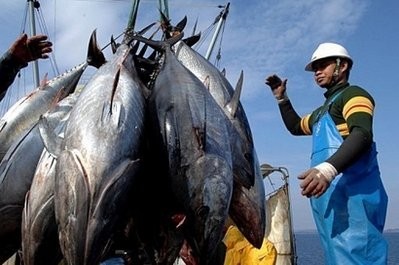TOKYO (AFP) – The Japanese government, sushi lovers and seafood traders at Tokyo's massive Tsukiji fish market on Friday cheered the defeat of a proposed ban on trade in endangered Atlantic bluefin tuna.
The proposal for a ban on trade in hauls from Mediterranean and eastern Atlantic was crushed Thursday by a UN wildlife meeting in a move described by the European Commission as threatening the survival of the ocean predator.

"It was good," said Prime Minister Yukio Hatoyama. "It means the import of bluefin tuna will continue for the time being and I think it's good that the price of bluefin tuna will not rise further."
But he added that Japan "should be on alert as we still don't know what will happen" until the end next week of the meeting in Doha of the Convention on the International Trade in Endangered Species (CITES).
A smiling Finance Minister Naoto Kan said he often enjoys "negi-toro", minced fatty tuna mixed with leek usually served on rice.
"It's good that I will be able to keep eating it," he said.
Chief Cabinet Secretary Hirofumi Hirano, the top government spokesman, said: "I am relieved that it was voted down last night. I am delighted about that.
"It is important to control natural resources as Japan has argued," he added in a regular news conference.
Environmental group Greenpeace warned the vote "sets the species on a pathway to extinction" although it is unclear exactly how long the worldwide bluefin population has left at current consumption rates.
Japan consumes three-quarters of all bluefin caught in the world's oceans, mainly raw as sushi and sashimi. A piece of "otoro" or fatty underbelly now costs 2,000 yen (22 dollars) at high-end Tokyo restaurants.
Decades of overfishing have seen stocks crash by more than two-thirds in the Mediterranean, from where giant freezer ships have long headed for Japan.
Fish traders and chefs at Tokyo's Tsukiji market, the world's biggest, were heartened that they will be able to keep importing the species, which arrives deep-frozen by the hundreds for daily pre-dawn auctions.
Tuna traders at Tsukiji, the size of more than 40 football pitches, last week staged a protest against the proposed trade ban on the fish, which has fetched as much as 175,000 dollars for a 232-kilogram (511-pound) specimen.
"It's really good that the proposal was voted down. Japanese people love tuna and salmon," said sushi chef Satoshi Suzuki, as he rolled out tuna for the lunchtime crowd at a restaurant on the edge of the market.
He said he recognised Japan should manage marine resources sustainably but added that ordinary people do not consume the prized fish in large quantities.
"People don't eat bluefin tuna every day unless they are rich," he said.
Japan had fought hard to block the trade ban proposal, arguing that the solution lies with enforcing existing quotas set by the International Commission for the Conservation of Atlantic Tunas.
Environmentalists complain that lax enforcement by ICCAT has already driven Atlantic bluefin tuna close to extinction.
Fisheries Minister Hirotaka Akamatsu said Japan would now exercise "leadership" in managing bluefin resources. "It's true that we now have the responsibility to do this," he said.
Not everyone in Japan was happy with the vote.
"We're disappointed by the decision," said Soyo Takahashi, a fisheries expert at the Japan office of Traffic, the wildlife trade monitoring network which cooperates with the CITES secretariat.
"We have not seen meaningful discussion on a recovery plan based on science for Atlantic bluefin tuna at the CITES meeting."
With bluefin and many other fish species in decline in the world's oceans, she said, "Japanese consumers of sushi need to rethink their lifestyle and choose seafood from sustainable fisheries."
























